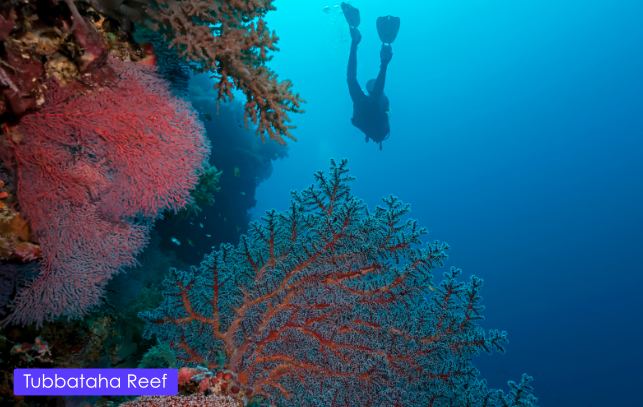The waters of the Philippines sit within the Coral
triangle and provide world class diving opportunities in pursuit some of the most
sought after marine experiences, including seeking out Manta Rays and Whale
sharks among its fine diverse coral gardens.
At the heart of the Pacific theatre during the Second
World War, the area is also a heaven for wreck divers, with a plethora of
sunken American and Japanese vessels to explore.
With over 7,000 islands, the country abounds with diving
possibilities, with small schools catering to the tourist market in many
locations, but the main infrastructure of Philippines diving is focused on a
few choice destinations.
Luzon, the archipelago’s main and most northerly island, has three main dive centres. North of Manila, Subic Bay, although not a general
recreational diving destination, suffering from relatively poor visibility due
to its proximity to Mount Pinatubo, and its eruption's silt deposits, does offer the
enthusiastic wreck diver features some fine attractions including the USS New
York and other ships scuttled to avoid capture by the Japanese.
South of Manila, Anilao is the original dive centre in
the Philippines and has a normal visibility range of at least 20 metres, and is
especially good for first time divers, with a few more remote sites that will
also satisfy the experienced. Eagle and Blue-spotted Rays, Jacks, Snappers and
Black and White Tip Reef Sharks are commonly found among the many colourful smaller
fish species grazing the corals.
In southern Luzon, Donsal is revered as a place to see
Whale Sharks, while offshore, these gentle giants can also be seen alongside
the magnificent Manta Rays at the legendary ‘Manta Bowl’ near the island of
Ticao.
Southward, across the water from Anilao, on the
neighbouring island of Mindoro, Puerto Galera is the focal point for abundant
offshore diving, with over 450 coral species and numerous fish to explore at
all levels of experience. The iconic ‘Canyons’, vertical walls and fan corals of Verde Island
are a particular lure for experienced divers.
Just off the west coast of Mindoro, the Pandan islands
offer some good recreational diving, but the main attraction here is further
offshore at the globally famous Apo Reef and its nineteen dive sites, where you
can spot Manta Rays, Barracuda and a whole host of sharks among the resplendent
marine life in these crystal waters.
Close to Palawan, a premier location for both
recreational and sport divers, are the waters of the nearby Busuanga and Coron
Islands, which hide a host of sunken Japanese wrecks, while on Coron Island
itself, Barracuda Lake, offers the strange experience of layered fresh water and sea water.
Palawan’s Bacuit Bay, off the island’s northwest coast, has numerous leisure diving opportunities among its clustered island gems and
is a great place to learn to dive. On the other side of Palawan, at Puerto
Princesa, Honda Bay offers further good diving.

TUBBATAHA REEF
For the serious sporting diver, a liveaboard boat from
Puerto Princesa will take you out in the Sulu Sea to the remarkable Tubbataha
Reef, whose exquisite pristine isolation has earned its singularly unique status as a
UNESCO Marine World Heritage site, a National Marine Park, and the accolade of being
one of the World’s top dive sites, a crucially important global marine haven to
over 360 corals and over 600 fish species.

At this amazing underwater marvel, you’ll find the iconic
large ocean travellers such as Dolphins, Whales, Eagle and Manta Rays together
with a numerous shark species, including Whale Sharks.
Just off the north coast of Panay, the island of Boracay
is the home of the Philippines’ most famous beach resorts and is good for leisure diving and, at Yapak, off the north tip of the island, the wall dive will also appeal to experienced divers.
At the south end of Negros Island, accessible from
Dumaguete, Apo Island, not to be confused with the reef of the same name
offshore from Mindoro, is one of the Philippines’ best known and highly
rewarding dive sites.
Across the Tanon Strait, The Island of Cebu has two main
diving centres. Moalboal, on the west coast near Pescador Island, is
renowned for its big wall dives and diverse marine life. Off the north coast of
Cebu, the island of Malapascua is the gateway to several dive sites, including
the Monad Shoals, famed for its Thresher Sharks, Hammerheads and Mantas.
Another dive site here will take you to the wreck of the Donna Marlyn cargo
vessel.
Travelling across the Cebu Strait brings you to the
island of Bohol and, offshore from its northwest tip, the island of Calibao is cherished for its drift dives, with such luminaries as Stone Fish, Scorpion
Fish, Leaf Fish and Sea Snakes among the usual array of sharks, jacks and
Barracuda. The Macro life is notable too, particularly its Pygmy Seahorses.
At the southern end of Bohol, Panglao Island is also a great
destination for divers, with Alona Beach the starting point for the premier
dive spots around Arco Point, famed for its dive-through tunnel, neighbouring
Balicasag, known for its wall diving, and Pamilican, a good drift dive location.